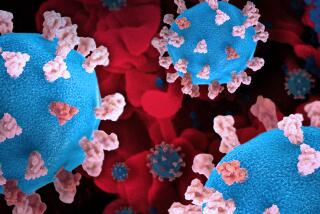Sharpening the Attack on AIDS Virus
- Share via
A UC San Diego researcher said Tuesday that she has developed a pair of “molecular scissors” that can cut the AIDS virus into pieces, a development that doctors might use one day to halt the disease’s deadly ability to spread throughout the body.
In laboratory tests, the molecular scissors developed by UCSD researcher Flossie Wong-Staal and researchers at Northern Illinois University have successfully slowed the fast-spreading virus by limiting its ability to reproduce.
The scissors use a naturally occurring enzyme that, when properly positioned, stops the AIDS virus from reproducing and attacking new cells. Researchers are sharpening their scissors on blends of related enzymes that are more likely to stop the spread of the acquired immune deficiency syndrome, Wong-Staal said.
Halting the spread of the AIDS virus in patients’ bodies is an important goal for researchers because the virus devastates immune systems. When cells that defend the body against disease are killed off, patients fall victim to several deadly infections, nervous system disorders and different kinds of cancers.
Wong-Staal, in a football analogy, said that researchers want to prove that the scissors can safely and effectively “intercept the (AIDS) virus at any point as long as it hasn’t reached the goal line.”
Wong-Staal, one of the nation’s leading AIDS researchers, is optimistic that the novel scissors will halt AIDS’ spread in infected patients. But she cautioned that “something that works in a tissue culture (in the laboratory) might not work in humans.”
Human clinical trials to determine safety could begin during 1993, Wong-Staal said, but the important trials to determine whether the scissors work won’t begin for several years. “A lot of refinement is needed,” Wong-Staal said Tuesday during a Council for the Advancement of Science Writing meeting in La Jolla. .
Wong-Staal linked the success of the molecular scissors to the discovery of an effective delivery system that will speed the enzymes to the proper cells. Those delivery systems likely will be discovered by researchers who are making dramatic inroads into the manipulation of genes.
Human clinical trials for the scissors technology will be developed in large part by the UCSD School of Medicine’s newly formed Program in Gene Therapy. The program is designed to speed the most advanced research at UCSD laboratories into human clinical trials.
The program’s staffers would “help to design the right protocols to ensure that clinical trials are conducted safely and accurately,” said Fred Gage, a program co-director. “Safely and accurately are the key words.”






